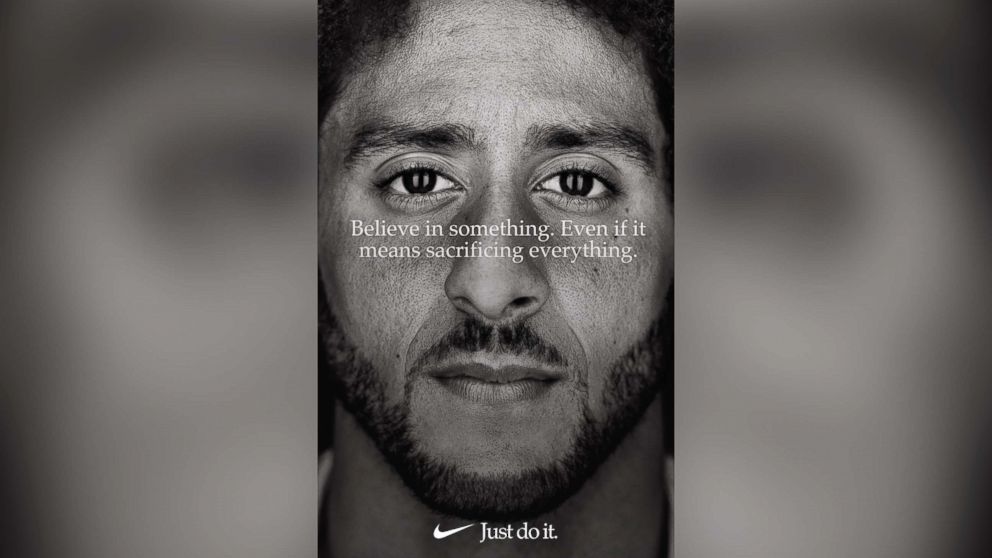Nike's Colin Kaepernick 'Just Do It' campaign is controversial, but on brand: Experts
Nike commemorated the 30th anniversary of its iconic "Just Do It" campaign with ads featuring embattled NFL player Colin Kaepernick -- a move that immediately raised controversy online.
Some see the ads as a risk for the company, but experts say Nike has been known to embrace public controversy.
The ads were revealed Monday on the unsigned quarterback's Twitter account -- just days before Thursday’s NFL season opener. Kaepernick tweeted a photo of himself with the caption: "Believe in something. Even if it means sacrificing everything."
Several calls to boycott Nike immediately began circulating on Twitter, complete with images of people burning their shoes. Others expressed support for the company and Kaepernick.
But whether the controversy will hurt the brand's business remains to be seen, analysts say.
"Nike has never shied away from taking risks, be it fashion or endorsement risks," said Simeon Siegel, an analyst at Nomura Securities who covers Nike. "Anytime a brand puts a name to a face, there’s risk and reward they’d have to take into account."
The early backlash may or may not prove to be an issue for the company, but the campaign with Kaepernick is likely to generate a lot of attention.
"Blowback remains to be seen. Anticipating potential negative responses is tough to predict, but critical to think through. Nike’s critical competitive advantage is the size and budget of its marketing arm -- they sell those products in a way competitors can’t because of size," Siegel said, adding, "marketing is just as critical as the product at Nike."
Kaepernick has been signed with Nike for several years. The brand is reportedly creating a line of shoes and apparel with his name to accompany the launch of this campaign.
The now-unsigned quarterback became the face of the NFL national anthem controversy, starting in 2016. He initially sat during the anthem as a silent protest against police brutality toward minorities. He began to "take a knee," or kneel, during the anthem after consulting with U.S. Army veteran Nate Boyer.
The gesture remains a hot-button issue as players continue to take a knee for the third year in a row. Critics call the move disprectful to veterans and the flag.
Nike is one of the National Football League’s biggest partners as the official uniform provider for the league. Earlier this year, the deal was renewed until 2028.
"The National Football League believes in dialogue, understanding and unity. We embrace the role and responsibility of everyone involved with this game to promote meaningful, positive change in our communities," said Jocelyn Moore, the NFL’s executive vice president of communications and public affairs. "The social justice issues that Colin and other professional athletes have raised deserve our attention and action."
Nike stock was down just over 3 percent on Tuesday, at $79.60 a share, but it's too early to tell how it will ultimately fare. Nike did not immediately return ABC News' request for comment.
The Nike ad is the second coup for Kaepernick in a week. Last year, he filed a grievance against the NFL, claiming the League and its 32 teams colluded to blackball him because of his anthem protests. Last week, the arbitrator denied the NFL’s request to dismiss the case and rule that the case will get a full hearing, in which potentially damaging information could be revealed.
It can turn some people off for sure. And it can turn some people on,” Castillo said. “Nike wins in either case, because they’re burning something they already paid for.”
Whether or not they are a political statement or taking a position, the Kaepernick ads are also just advertising. They exemplify a change in advertising as the industry has adjusted to the information overload of the internet era, marketing experts say.
"This is perfectly in line with the biggest change in advertising in the last two decades because advertising has moved from being informative to demonstrative,” Ed Castillo, former chief strategy officer at Arnold Worldwide and TBWA/Chiat/Day said. “Advertising used to be a great place to learn about products and services. In the internet era, now advertising is a terrible place to learn about something. Can you imagine learning about wireless phone service from advertising?"
"What advertising is great for reinforcing a company’s place in the world. It reveals conviction, it says, 'This is what we’re all about.' I think Nike has always has been a brand that lives its convictions. You can say that without taking a political point of view. Some people will misunderstand it as protest against armed forces. But you can have a discussion of how relevant this is and how appropriate this is as a marketing move without touching that third rail.”
As for the backlash and some customers burning their shoes, it may not ultimately harm the company.
"It can turn some people off for sure. And it can turn some people on," Castillo said. “Nike wins in either case, because they’re burning something they already paid for.”




